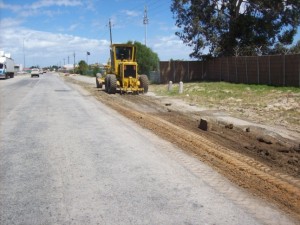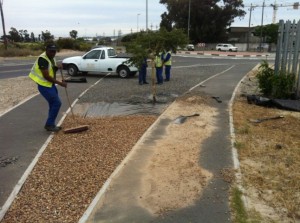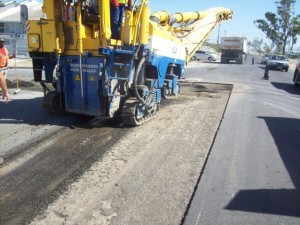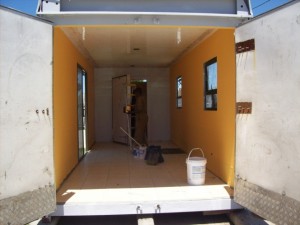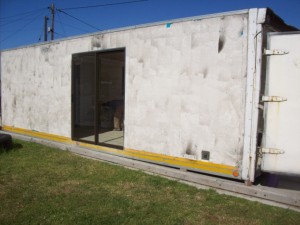Welcome to the November / December 2012 issue of the Blackheath City Improvement District Newsletter. So we are getting ready to say goodbye to 2012 already. The year was filled with challenges and will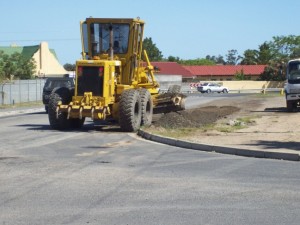 no doubt continue to present some more difficulties as we near the shut-down period. It seems that most businesses will close around the 14th of December and re-open on the 14th of January 2013. Please read further to ensure that you brief yourself on Safety and Security before you go away on holiday this year. We wish you a joyful and festive holiday period and hope that you come back safe and well in 2013.
no doubt continue to present some more difficulties as we near the shut-down period. It seems that most businesses will close around the 14th of December and re-open on the 14th of January 2013. Please read further to ensure that you brief yourself on Safety and Security before you go away on holiday this year. We wish you a joyful and festive holiday period and hope that you come back safe and well in 2013.
November was an extremely busy month for us at the BCID, as we took on many cleansing projects, verge upgrades and installed new street names at all the intersections within the area amongst many other things. Road works and verge levelling were seen throughout the area and the developments along Wimbledon Road were and continue to be a major highlight
The first of the housing project recipients in Happy Valley moved into their new homes as Phase one of the Happy Valley Housing Development was completed and handovers were done to the new and extremely happy beneficiaries on the housing list.
We awarded the winners of the Blackheath CID Greening Competition with their prizes of R1000 meal vouchers to the Skilpadvlei Wine Farm Restaurant. You may remember that we had three winners. This competition will continue into 2013, starting anew in February when we will choose another 3 winners for the first half of 2013.
Look at the beautiful spaces they have created in the background of the photo’s below. Remember I am very happy to help you develop your green spaces and look forward to hearing from you. We still have Palm Trees, Yucca’s and some other trees and shrubs available to donate to your cause. They can be viewed at the BCID Office where I have a little nursery going. As usual…
We have begun with the reinstatement of the verge at the roundabout at the corner of Wimbledon and Buttskop Roads. The original garden that we developed three years ago suffered damage during the welcome and most necessary road works that were carried out as part of the neighbouring housing developments. We hope to complete the first phase of this project by the end of the year and continue in January with a completion date of the 31st of January. This project will be taken up in partnership with the City Parks division of the City of Cape Town and various other role players.
The Road works in Wimbledon Road were a specific highlight over the last few months and they are making good progress as part of the development of the Happy Valley informal housing area.
We have done a lot of work on the container that will be used by Sing for Africa for workshops and prayer groups for the local Women’s Group they have formed in Happy Valley. Total cost to the BCID R0.00… Zero… Zip… Nothing… The City of Cape Town’s Social Development Directorate and various other role players funded the upgrade of the container for us. A special thanks to Mr Heinz Modricky from Metalian who assisted us in separating the container from the trailer it was fixed to.
Ever year in December we send out an email to assist with planning for the Christmas Shutdown Period. We find that very often companies lack planning for this time when the Industrial area is pretty much deserted and the surrounding residential areas are well, fully populated, with everyone being on holiday.
This year the shut-down period will run for an entire month from the 14th of December 2012 until the 13th of January 2013. This situation creates the perfect setting for opportunistic crime and criminals to operate within the area and we therefore need to ensure that our assets are safe. Also though, it is important to protect our homes, whether we are away or staying home during this time and then also to protect ourselves and our families and planning therefore is essential.
Attached are some guidelines that I send out annually to assist with planning and we hope that this year we all enjoy a safe and festive end of year break, happy in the knowledge that we have prepared ourselves well and that our assets are safe and accounted for, whilst the Blackheath Industrial Area is patrolled and kept safe by ADT and ST3 Security and various other Private Security Companies and the local divisions of Law Enforcement, as is the case every year.
Remember to contact the BCID’s Security Supplier, ST3 Security’s Mr Adolf Bezuidenhout for support with any Security issues on 021 905 3399 0r 086 000 BCID (2243) to make a report of any Security Risk within the Blackheath Industrial Area or contact me directly for any advice.
Security Guidelines for the 2012 Shutdown period
Security guidelines for alarm and key holder services when you are away from home / the office
- Before we know it the holidays will be upon us and I appeal to you, prior to going away on holiday, to PLEASE ensure that your key holder information with your alarm response company is still relevant and correct!
- PLEASE ensure that your key holder lives nearby and that they are willing to assist in your absence. It is no use having a member of your family who lives far away, as the role of a key holder is to meet the Armed Response officer at the business / residence when the alarm is activated to enable them to inspect the property properly. If possible, the designated key holder should hold keys to the premises as well as the alarm keypad code so that they can give the armed response officer access to the premises to ensure that no one is inside and if necessary the key holder can reset the alarm.
- Your armed response supplier can include “special instructions” onto your details on their systems for specific procedures. This may include Medical aid details, allergies, or details of the family Doctor.
- You are also reminded to update employee details such as their name and days that they may work.
IF YOU ARE AN ADT CLIENT UPDATE YOUR INFORMATION BY CONTACTING:
ADT’s CIS Department on 086 12 12 300, Fax: 086 12 12 305 or E-mail: cis.cpt.adtza@tycoint.com
IF YOU ARE AN ST3 SECURITY CLIENT:
Call ST3’s Head Office on 021 905 3399 / 079 274 9841, Fax: 021 905 0122 or Email: operations@st3group.co.za
Security Guidelines for Cash in Transit
DO NOT TRANSPORT CASH AT THIS TIME OF THE YEAR AND DO NOT PAY CASH WAGES – YOU HAVE BEEN WARNED! – THIEVES OPERATE IN AND AROUND BANKS AND IN AND AROUND INDUSTRIAL AREAS AT THIS TIME OF YEAR AND ESPECIALLY ON FRIDAY THE 14TH OF DECEMBER 2012!
IF YOU INSIST ON TRANSPORTING CASH OR ARE FORCED TO – please remember that:
“Failing to plan means Planning to fail”
Preparation – You are strongly advised to use a suitable vehicle fitted with steel cash box, radio communication and an alarm system. You may be required to do it with the firm’s van or a company car.
Warning – The Police Crime Prevention Unit hereby advises you about certain precautions you should take to minimise the risks involved with this type of exercise.
Plan the route – if cash transit is to be a regular task, try to vary your route and timings. Use a different vehicle from time to time. Keep your plan secret. Consider the use of a safe. Plan for an alternate route – escape in case of attack.
The crucial moment – The high risk time occurs when ENTERING or LEAVING the vehicle with the money.
Before leaving the bank or office – check around the queue, inside and outside of the building for anyone loitering or for suspicious vehicles parked nearby.
If in DOUBT – stay inside until the route to the vehicle is clear.
At your destination – With the cash, remain inside the vehicle until you are satisfied that all is CLEAR.
The escort – if any, should leave the vehicle before the cash carrier, then both must enter the building as quickly as possible.
In case of a minor accident during the journey, don’t leave the vehicle if you are involved in what appears to be a minor accident. Beware of a staged accident.
Cultivate and adopt suspicious attitudes – Don’t speak to suspicious persons. Bear in mind that a malefactor could work under disguise. This trick has already been used in a number of occasions.
What you should do if you are being tailed once you are suspicious? – Slow down to allow the tailing vehicle to overtake or make a detour of your planned route to see if it stays behind you. If the vehicle keeps following you, drive directly to a place of safety. Note the vehicle registration and description and pass this information on to the Police immediately.
Standard Bank Banking Tips
Follow these hints and tips to keep your business moving forward!
With the year-end rush in full swing, it’s important that you stay alert to the risks that your business may be exposed to over the festive season. With this in mind, we’ve put together a list of the more common risks you should be aware of, as well as solutions that will help protect your business against these pitfalls:
RISK #1: Fraudulent changes to beneficiary account details
Fraudsters know that this is a busy period for you, and that this can result in your being less vigilant in terms of administration.
SOLUTION: If you receive a request to change beneficiary account details, be sure to use the Account Verification Service on Business Online and match the account details to the company’s details. If you are not a Business Online user, you will still be able to verify the account details at any Standard Bank branch.
RISK #2: Changes to salary dates
Many companies change their payroll dates at year-end. Companies may change from traditionally paying on the 20th December to the 15th, or from the 25th December to the 20th for example, and this could impact your ability to collect monies owing to you via debit order or NAEDO.
SOLUTION: Contact suppliers and customers and maintain a calendar in this regard. If you collect monies via NAEDO or debit order, consider changing your collection dates and NAEDO tracking periods where mandates permit.
RISK #3: Empty wallet syndrome
Unpaid debit orders always peak over the year-end period. People traditionally struggle to manage funds because of the extra expenses that are incurred.
SOLUTION: We suggest that you re-look your collections methodologies and risk ratings. Putting more direct debits on NAEDO could help protect your cash flow. Look at your 2011 patterns and consult with your Business Banker, or email us businessonline@standardbank.co.za for additional assistance.
RISK #4: Missing big orders
As you scale up to meet the high demands of your customers, make sure that you pay your suppliers timeously to avoid missing orders and deadlines.
SOLUTION: Consider your existing payment limits and borrowing limits to ensure you can pay for any additional inventory.
RISK #5: Late payments
Make sure you don’t lose out on settlement discounts by missing payment dates.
SOLUTION: Create payment dates in advance by using the future dated payment services available on our online banking systems so that you can enjoy your time away knowing your creditors have been paid.
RISK #6: Running lean
Your staff have earned their time off, but your business needs to keep running. Businesses tend to be more vulnerable when key people are away, so make sure you don’t give passwords or user profiles to temporary staff, and don’t allow staff members to share passwords or profiles.
SOLUTION: If you have Business Online, contact us to load new operators and update your profile. This applies to signatories on the accounts as well as the designated people on your Business Online profile.
RISK #7: Not paying staff on time
We advised you to be certain of paying creditors, but keeping your most valuable asset happy is even more important. Don’t be caught out by the holidays and miss their salary transfers.
SOLUTION: Check the calendars, future date the payments and make sure your limits are appropriate so that you can pay your staff their well-deserved bonuses.
RISK #8: Becoming a victim of robbery
Over the festive season, your business becomes a more attractive target for thieves since you tend to have more cash at your site from sales, or to pay additional staff.
SOLUTION: Despite encouraging the use of electronic channels, physical cash collections are likely to continue. To address this, we have designed a number of cash solutions to improve your overall management and control of cash. In particular, they look to reduce your risk, enhance security and improve efficiencies with simpler processes.
Standard Bank’s AutoSafe devices for example, are automated cash-accepting (notes only) devices that create a secure environment to deposit cash. They provide you with an audit trail of all transactions, from the time of deposit to delivery and processing at a Standard Bank cash centre. These are implemented by a professional team which also provides extensive training and support on an ongoing basis.
You may also wish to consider alternative ways to pay your employees – by opening bank accounts for them and transferring their salaries/bonuses electronically into these accounts. Speak to your business banker for more options on employee banking.
Just another way we’re taking care of your business!
We hope you found this quick checklist useful. If you would like more information on these, or our many other Business Banking solutions, consult with your Business Banking team or visit our website at www.standardbank.co.za
Protecting the elderly
- Cover up expensive looking jewellery when going out alone to the market, the medical practitioner or to the chemist.
- Beware of pick pockets during pay days (pension).
- Avoid short cuts whilst going to the bank or returning home.
- Never accept a lift from a stranger or from people you have just met.
- If in danger scream to draw attention for help.
- It is always advisable to be accompanied whilst going out to the hospitals, banks or the post offices.
- If you are alone at home, never open to a stranger. Talk to him through the window.
- Check the credentials of any stranger before you open the door fully. Ask to see the identity card.
- Keep a friendly relationship with your neighbours. They will be the first persons to help in case of need.
- Never keep large sum of money in your house. Cash is safer in banks and in post office accounts.
Protecting your children
- To be Safe. Teach children that everyone has rights; no-one should take away their right to be safe.
- To protect their own bodies – Children need to know that their body belongs to them. They must say NO to whosoever touches particularly the private part.
- To Say NO – Children have to say NO to any one if that person tries to harm them.
- To get help against bullies – Tell children to enlist the help of friends or an adult in cases of real physical danger.
- Keeping them safe is the most important consideration – Tell children not to fight to protect their belongings against bullies.
- To tell – Reassure your children that no matter what happens, you will not be angry with them and that you want them to tell you of any incident.
- To be believed – Children need to be believed and supported, especially in cases of sexual assault as children very rarely lie about it.
- To not keep secret – Teach children that some secrets should NEVER be kept, no matter if they promised not to tell. Child molesters often say that a kiss or touch is “our secret”.
- To not talk to strangers – Teach children to ignore any stranger. They do not have to be rude, they can pretend not to hear – walk quickly or run away. * To break rules. Tell children that they have your permission to break all rules to protect themselves and to stay safe.
Safety tips for teenagers
- Be sure that your parents always know where you are and how to contact you.
- If possible go out accompanied by friends and return home with them.
- If you do go out alone, arrange transport to and from where you are going, with a relative, friend or taxi and confirm arrangement for your return journey before you set off.
- Don’t accept the offer of a lift from someone you have just met. * If any one calls don’t let him/her into the house.
- Ask telephone callers to ring back; don’t tell them you are alone. It helps to keep a list of emergency numbers in case of problems. * Wherever you are be aware of how to make an emergency call and the quickest way out.
After an aggressive attack
- Go to a place where you will feel more secure.
- Inform a friend, a doctor or the Police.
- The sooner the case is reported, the better it will be for the early arrest of the aggressor.
- Don’t wash yourself or change your clothing prior to an examination by the Police Medical Officer.
- Don’t forget you are only the VICTIM. DO NOT FEEL GUILTY for what may have happened. Your help to track down the attacker is imperative, before he relapses.
Your Home
- The fence outside is the first line of defence.
- The front of the house is to be visible to passers-by so that any burglar cannot work unseen.
- Thorny hedges at the boundary are an additional deterrent.
- Lock ladders inside the garage or shed to prevent a thief from using them.
- Don’t hide your house keys under the door mat or in a flower pot. A thief will look there first.
- Never leave a garage or garden shed unlocked, especially if it has a connecting door to the house.
- Don’t advertise your absence by leaving lights on outside of the house during the day. Rather use a time switch to turn light on and off.
- Visible burglar alarms make burglars think twice.
- Front-door to be fitted with a dead lock – Mortise lock.
- Use a door viewer to identify the caller before opening the door.
- Put the door chain on before you open to a stranger.
- Do not leave keys in the door lock.
- Small windows, skylights or bathroom fanlights might need locks. It is possible for the thief to wriggle through any gap larger than a human head.
- Reinforce the windows and other openings with burglar proof. * Always lock up your home before leaving.

